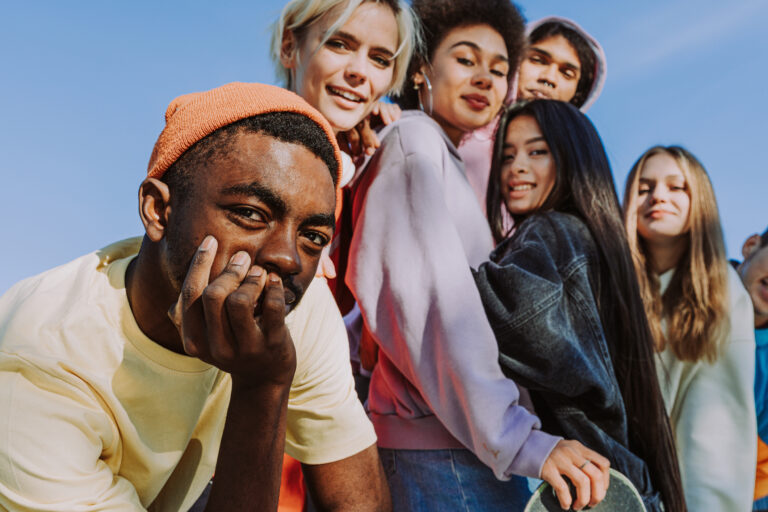This scene is a highlight of season six of Mozilla’s IRL podcast. It’s a vivid example of one of the benefits of presenting a report as a podcast.
Since 2017, the non-profit Mozilla Foundation has published an annual Internet Health Report that explores the state of the internet. The report digs into issues around privacy and security, openness, and digital inclusion. It focuses on the stories of people around the world who are challenging tech’s status quo. In the report, the Foundation created something reflective of the global human digital experience.
In the past, the Mozilla Foundation published its report online. It’s always been a creative publication; not a dry tome full of facts and figures, but a well-thought-out digital presentation with great analysis, visuals, stories from many perspectives, and in-depth data pulled together from a range of tech communities. A couple of years ago, they started adding sound clips of the voices of people from around the globe.
Human stories take center stage
Solana Larsen, Editor of the Mozilla Foundation’s Internet Health Report, has a passion for doing justice to all perspectives and stories she covers. She realized that hearing people tell their stories is an emotional conduit that makes the data real, and helps us to understand sometimes abstract concepts in deeply human terms.
The Foundation identified AI as the next key challenge of the internet; the next thing they would focus on to make a difference. So this year’s report takes a deep dive into artificial intelligence: who has power over AI and who are the builders and influencers shifting that power? Focusing on one thing this year positioned the report well for audio, which can zoom in on a topic and explore it through many lenses.
The Mozilla Foundation decided the time was right to release its entire report as a podcast. AI touches the lives of so many people in profound ways: through surveillance, social media manipulation, and even the mapping of neighborhoods. For the Mozilla Foundation, it was important to put the people front and center. So the decision was made to release its report on AI as season six of Mozilla’s award-winning IRL podcast. Solana Larsen explains:
“With our podcast, we could literally give voice to people. And that truly matters; conveying their passion and their stories in their own words. With technology topics, in particular, people don’t necessarily expect to hear a heartbeat. But it’s important.”
The challenge: find the heartbeat in every episode. Translate a report full of valuable information, data, and stories, into an engaging podcast.
Research brought to life
The solution was to play to the strengths of different media. A podcast is fantastic for telling stories and creating powerful connections with people around the globe. But audio can quickly be bogged down with too many stats and numbers. To that end, the Mozilla Foundation put the supporting materials online, pairing the podcast with an impressive website with all the complementary data, longer excerpts from interview transcripts, and photo portraits of the guests.
The podcast tells the first-person stories; the online materials deliver the research, analysis, and numbers. It’s a formidable one-two punch that delivers emotionally and intellectually.
The target audience for IRL includes software developers, UX designers, and policy influencers focused on AI so Mozilla decided to anchor the podcast in real-life stories of researchers, technologists, and activists who advocate for change to laws and regulations.
The first episode tells the story of a former Google employee who walked away from her job when she found out that the AI tools she was helping to build could be used in potentially harmful surveillance. Hearing the determination in her voice as she remembers her decision to leave her job has a powerful impact.
Pairing powerful stories with a website filled with great content makes publishing a report-as-podcast exciting without sacrificing the depth of information.
Another advantage of turning a report into a podcast is the presence of a host as a guide. The host can play an active role in bringing a report to life; pacing the telling of the story and teasing out key points. Bridget Todd, the host of IRL and host of the technology podcast There Are No Girls On The Internet, brings her personal experience to every episode, along with a keen interest in how technology can be used to help communities rather than harm them.
Ultimately, a major report is the product of thousands of hours of research and effort, and often reflects the core beliefs and passions of an organization. For the Mozilla Foundation, this shows in their commitment to exploring what it means for the internet to be healthy. Using the power of storytelling through podcasts strengthens the key messages of a report by introducing us to the people who are the center of the issue. Guests like José Gonzalez provide a vivid personal picture of important issues. The people at the heart of the stories help us understand what’s at stake.
Sign up for the Pacific Content Newsletter: audio strategy, analysis, and insight in your inbox.





